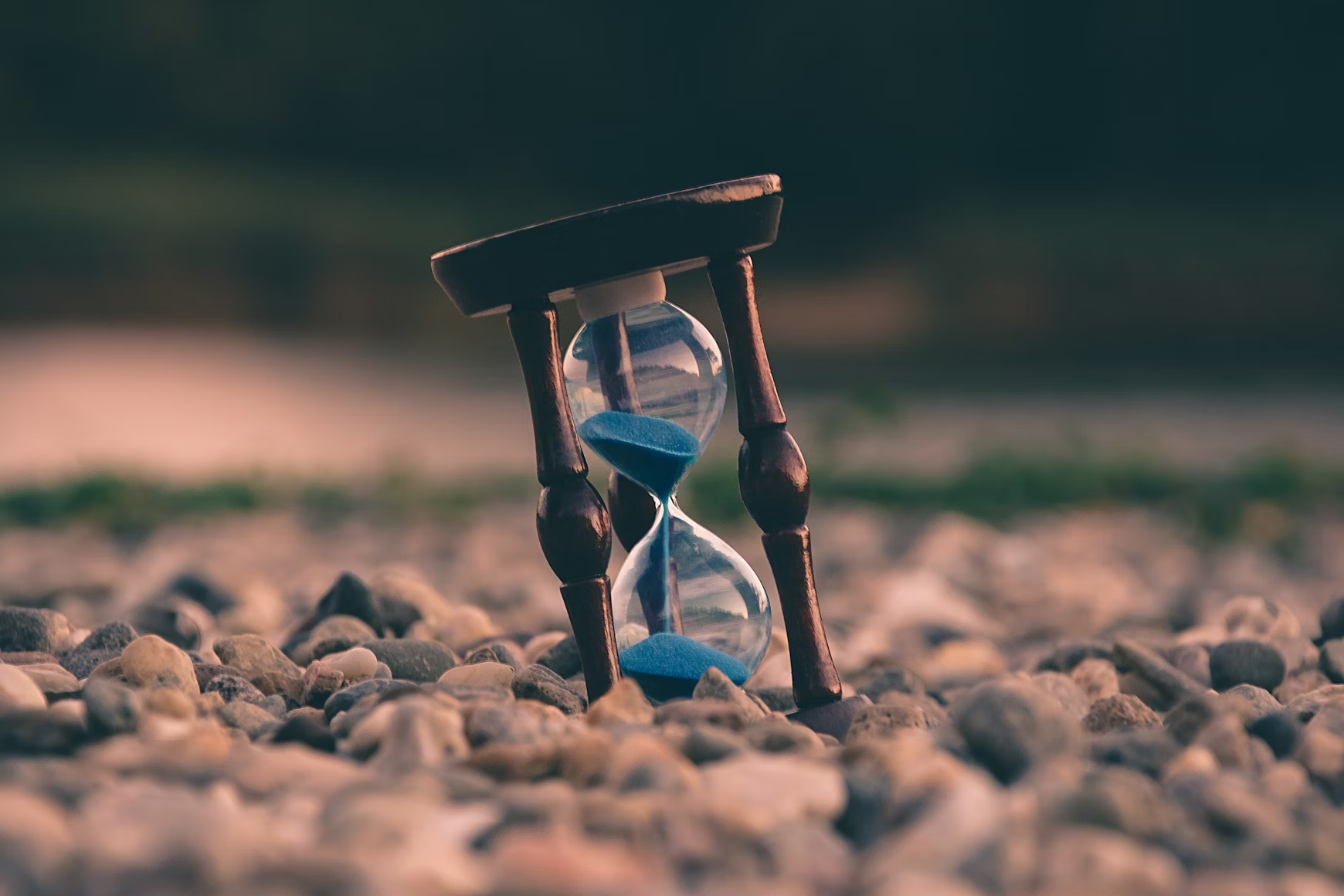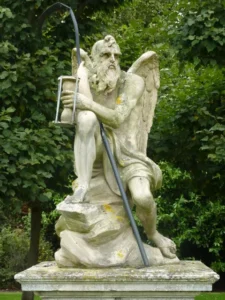Reimagining Time: Slowing Down To Navigate A World In Crisis

Image Credit: AronVisuals / Unsplash
At this critical juncture for earth’s life systems, it is well documented that approaches to ‘green the economy’ are falling short. So, the pivotal questions become: what steps can we take to find a new perspective and develop alternative approaches? With each new alarming report or study, we are made increasingly aware that we have a finite time in which to act. It was in 2018 that the IPCC report declared we only had until 2030 to keep global temperatures below 1.5 degrees. The ticking of the clock is getting louder and louder; twelve years is now seven. Yet are we really any further forward?
With urgency and fixed deadlines as our central message, we need to recognize we are also creating unintended consequences. The fear response our urgency triggers is moving many people into paralysis and now resistance, emotions that populist politicians feed on. I am not for a minute advocating we diminish the urgency. It is still necessary, vital even, but if we remain slaves to the clock and the tyranny of chronological time, we risk missing the perspectives and possibilities offered by being fully present to what is being asked of us at this time.
My initial and most helpful step on this path has been to discover the discipline and space to slow down. The very notion feels at odds with much of what I’ve learned and practised, but standing still amidst the raging current is the only way I know to catch a glimpse of a world that’s different, a world where new possibilities emerge.
The rudiments of time
Modernity draws heavily from the classical civilizations of Europe. But when it comes to time (as with many other things), we appear to have left much of the subtlety behind. The ancient Greeks had at least three distinct concepts of time:
- Chronos representing empirical time, is the arrow of time moving in a straight line from birth to death, linking the past, present, and future. It embodies linear time, time we measure in seconds, minutes, hours, or years.
- Aion on the other hand, signifies eternal time – time that is perpetual, unbounded, ritualistic, and cyclic. It is closely tied to the afterlife and the cyclical nature of events, like seasons or moon cycles.
- Kairos, the most distinct, represents the “right time” or the “opportune moment.” Kairos is born in the fizzing moment of the present, where all past and future elements dictated by Chronos converge into a singular moment filled with potential. It is associated with ripeness – the idea that everything has its moment. Kairos guides a farmer in knowing when to plant, water, or harvest in harmony with the eternal Aion.
All ancient cultures understood time had many faces. Yet today, we largely overlook Kairos and Aion, allowing Chronos to not only dictate our schedules but also to dominate our imaginations. Progress is dictated as a straight diagonal line, fuelled by the view that economic growth is paramount and perpetual.

Old Father Time, Sandringham Estate, Norfolk
Chronos has become our tyrannical master. He beats the drumbeat of action for the climate movement. I have become convinced that we can’t imagine deeper transformation within Chronos time. Breaking time down into units of seconds, hours, or even years constrains us. So how do we act more transformatively without alienating people?
In 2018 I had the privilege to sit in a three-day Council meeting with Chief Oren Lyons and other elders of the Haudenosaunee Nations in Upper State New York. The whole meeting was conducted without agenda or clocks and it remains one of the more transformative meetings I have ever been part of. One thing Chief Lyons warned us of was the challenges and sometimes folly of using the same tools to reform the system that had built it. Yet finance, technology, policy are all the levers I have been grabbing for to drive more change over the last two decades. I am not sure I really heard or understood the subtlety of his messaging then, but his words keep coming back to me in an echo. The subtle whisper of Kairos. He urged me to really listen to the Earth, to the river, the trees and plants, the birds, the crackle of the fire. To slow down and appreciate the beauty of the Earth. To let the Earth help me in reimagining time.
Slowing down to really listen is certainly a critical step to gain a new perspective. And now I am doing that more, the answer coming back is to really make change happen I must go deeper, not faster. Faster is what the modern economic system demands of each of us every day. It keeps me in my Sisyphean mindset. I also find the harder and faster I push, the more I risk burning myself out but also alienating others, which in turn seeds some of the polarization late-stage capitalism thrives on.
When I am successful in reimagining time and slow down, I am reminded of simpler truths such as the extraordinary beauty of the world I have been lucky enough to be born into. The love of family and friends. I become a better version of me that can use my privilege to better help others. And I can use the time to reimagine how I might direct my energy moving forward. Everything becomes more expansive. I can hold the paradox of the urgency of the task ahead and the need to slow down to be fully present to help enable a different future.
Reimagining Time in a World on Fire
Nowadays we all know the benefits of mindfulness born out of the deep wisdom of the Buddhist tradition. Too often the modern version of mindfulness emphasises the importance of becoming more productive, pulling us straight back to Chronos rather than sitting with the emergence of Kairos or Aion that is at the heart of all spiritual practice. But at its heart mindfulness is about deepening into our presence.
I recently had an extraordinary week on retreat at the Plum Village Monastery founded by Zen Buddhist Thich Nhat Hanh in the South of France. There, the monastic rhythm of life, the regular meditation sessions, mindful walks, and the simplicity of daily living created an environment where the concept of Kairos was woven into the very fabric of existence. Reimagining time became reality. Each moment, from a single breath to a shared meal, was an opportunity to experience the ripe and opportune. The rush of chronological time yielded to the eternal flow of Aion.
Great art and music can also take us there – I have the pleasure to sing in a choral acapella choir, and there are moments when our voices synchronise so seamlessly and harmoniously that I feel as if I am touching something eternal. It is also a great reminder for me of how much more beauty we can create collectively than any single voice could achieve in isolation.
For me, spending time to really connect deeply with nature has been one of the most powerful ways to slow down and find a new perspective. There is more and more research coming out highlighting the benefits of nature reconnection. The most profound experiences I have had are by spending multiple days really embedded in nature. I embarked on a vision quest in the summer of 2021 on the edge of Dartmoor, down in the wild southwest corner of Britain. A simple ritual practiced by our ancestors the world over for thousands of years. Over the course of four days, I battled boredom, endured hunger, braved wild winds and rain, and contended with the ever-present threat of ticks. It was on the third night of the quest that I experienced something extraordinary – I finally stopped trying to achieve anything or to ‘conquer’ the discomfort. Instead, I just submitted and surrendered. From that place, I had the most profound sense that the Earth herself was urging a slowing down, beckoning me to find a way back into harmony and rhythm with the natural cycles. It has been this call, along with the wise words of Chief Lyons, that I have been trying to heed these past years.
Conclusion
Our obsession with urgency and rigid timeframes may hinder our ability to respond most effectively. Rediscovering the subtleties of time, like the ancient Greeks’ concepts of Chronos, Aion, and Kairos, and other cultures’ broader definitions, moves you towards reimagining time. The great Nigerian trickster philosopher Bayo Akomolafe says it well: “The times are urgent: Let’s slow down.”
Build a deeper connection with the changing seasons of the world around you. Watch how nature moves, giving subtle suggestions on reimagining time for yourself. Slowing down is certainly providing me with both a new perspective but also the understanding of how I might live a simpler but richer life. It is helping me find a way to balance the urgency of action with the possibility that profound change can occur if I am more present to the emergence of now.

